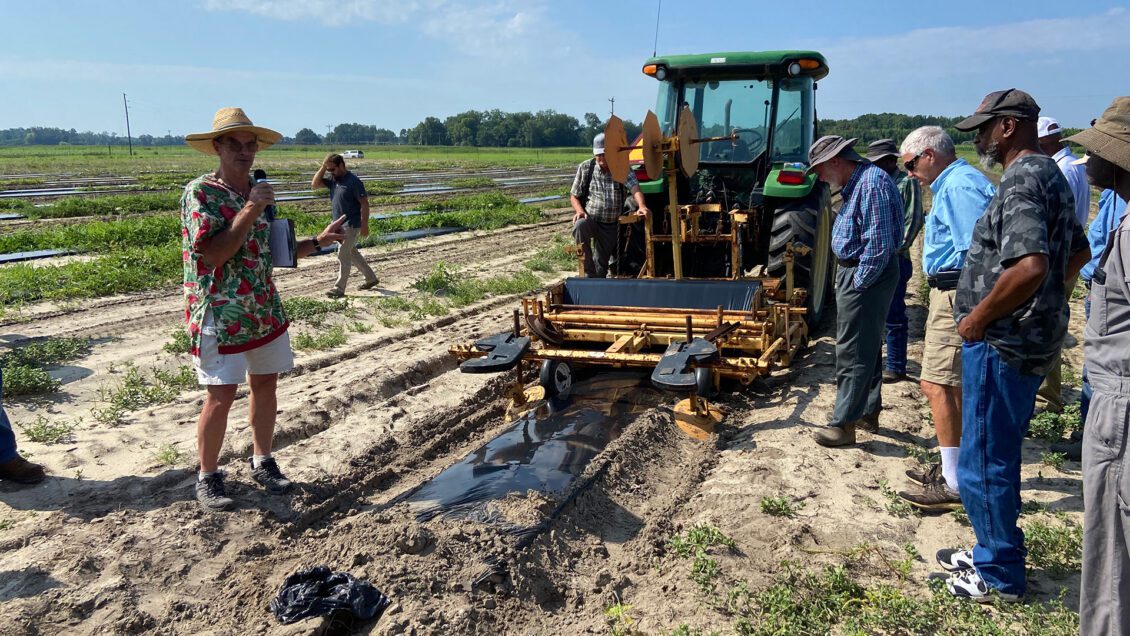
“Fusarium wilt is a devastating disease. We want to do what we can to help solve problems associated with this disease.”
Gilbert Miller, Clemson Extension vegetable specialist
Sweet, refreshing watermelon is a favorite summertime treat, but cooler-than-normal temperatures this spring have left South Carolina’s watermelon crop without the heat to fully flourish.
Watermelons are warm-season crops that grow best at average air temperatures between 70 and 85 degrees. Melon seeds do not germinate well in cold soil. While air temperatures may feel warm, temperatures in the soil usually are a little cooler early in the spring, then the pattern reverses. Watermelons should not be planted until after the last frost. The South Carolina watermelon season begins with planting in March and April and lasts until June in some areas. According to the United States Department of Agriculture, 3,100 acres of watermelons were planted in South Carolina in 2022.
During the 2023 Watermelon and Vegetable Field Day held recently at the Edisto Research and Education Center (REC), Clemson Cooperative Extension Service vegetable specialist Gilbert Miller told growers the daily heat units necessary to grow, develop and ripen watermelons were well below average this year.
“In South Carolina, watermelons need close to 800 heat units from female bloom to ripe fruit,” Miller said. “For 2023, we were about 200 heat units behind 2022.”
In addition, the South Carolina watermelon crop was harvested later than usual and there was a significant delay in soil temperatures reaching 81 degrees, resulting in a higher chance for plants to be infected with Fusarium.
“Fusarium wilt is a devastating disease,” said Miller, field day coordinator. “We want to do what we can to help solve problems associated with this disease.”
Symptoms include yellowing, stunting and death of seedlings, as well as yellowing and stunting of older plants. Delayed transplanting, cultivar selection and grafting can help manage Fusarium wilt.
“Delaying transplanting until the soil has warmed to about 81 degrees at a 4-inch depth can reduce the number of plants with Fusarium wilt,” said Tony Keinath, Clemson Research and Extension vegetable pathologist stationed at the Coastal REC. “Delayed transplanting does not affect the sizes of seedless watermelon fruit or the net return per acre. Growers can use delayed transplanting by transplanting severely infested fields last, but make sure the desired market window is maintained.”
Eleanor and Fascination are partially resistant cultivars that have been shown to perform better when Fusarium wilt is present. But grafting is more effective…and more expensive.
Grafting involves joining a crop plant, or “scion,” to the roots of a related plant, or “rootstock.” Carolina Strongback is a watermelon grafting rootstock developed by Clemson University and United States Department of Agriculture scientists. It has resistance to Fusarium wilt races 1 and 2, as well as tolerance to root-knot nematodes. Carolina Strongback was derived from two wild watermelon species, each with resistance to Fusarium wilt race 1 and 2.
“No Fusarium wilt developed on Fascination grafted with Carolina Strongback rootstock,” Keinath said. “Yields were higher for grafted plants, but grafted plants can be twice as expensive to buy.”
Keinath suggests planting one-half of a crop in grafted plants and one-half in non-grafted plants. Hairy vetch grown as a winter cover crop may help reduce Fusarium wilt in the spring.
Fusarium can survive in the soil for up to 5 years. Fusarium wilt of watermelon research continues at the Edisto REC. Bhupinder Jatana, assistant professor of horticulture and vegetable crops, is looking for two growers to participate in a fusarium study. Growers who are interested can contact Jatana at bjatana@clemson.edu, or call (864) 633-9087.
More information about Fusarium wilt can be found In Clemson’s Land Grant Press at https://bit.ly/3NS2j6l.
Solar Shrink mulch film
In addition to learning about the Fusarium attack, field day attendees also learned about using Solar Shrink mulch film to reduce weeds, increase soil temperature and maintain soil moisture. Heat from the sun causes this film to shrink and fit to the bed, or row. Solar Shrink plastic mulch is not biodegradable, but the company hopes to begin a mulch recycling program for this product.
According to Miller, the availability of certified biodegradable plastic mulch is very limited. Two agencies offer certification for soil biodegradable plastic mulch. The European Standard, EN 17033:2018 and the American Society for Testing and Materials (ASTM) both have similar standards for certifying soil biodegradable mulch films. A soil biodegradable mulch film demonstrated at the Watermelon Field Day, ecovio® M 2351 from BASF, is certified as soil biodegradable by EN standards. When growers are offered a biodegradable mulch film, Miller said they should ask if the mulch is certified.
“At this time, no commercially available certified soil biodegradable mulch is allowed for use on organic farms because none have been shown to meet the requirements of the National Organic Standards (NOP),” Miller said.
In addition to the certification standards set by the above agencies, the NOP also requires the mulch to be 100% biobased with no genetically modified organisms (GMO’s) used. All plastic mulch used in organic production must be removed at the end of each season.
To help organic crop farmers, a team of Clemson researchers led by Matthew Cutulle, vegetable weed scientist housed at the Clemson Coastal REC, is studying how anaerobic soil disinfestation can be used to fight weeds and nematodes. Anaerobic soil disinfestation (ASD) is a 3-step process that involves amending soil with a carbon source, irrigating to saturation and covering with plastic mulch to allow beneficial soil microbes to break down the carbon, depleting oxygen in the soil and producing toxic byproducts that kill soilborne pathogens.
Gaining knowledge
Participants in this year’s field day came from near and far to learn the best practices to use when growing watermelons and vegetables. Arkansas is seeing more watermelon crops grown and Karen Lee and Henry English from the University of Arkansas at Pine Bluff came to learn how they can help their farmers be more productive.
You can have a pretty watermelon, but if it doesn’t taste good, you just have a pretty mess.
Karen Lee, University of Arkansas at Pine Bluff
“There is no culture without agriculture,” Lee said. “Many of our small farmers are growing more watermelons and we want to learn how to help them grow more sustainable crops. Gilbert Miller is the expert we go to when we need watermelon information. We hold Zoom meetings with Dr. Miller and decided we would attend the field day to learn more.
“You can have a pretty watermelon, but if it doesn’t taste good, you just have a pretty mess.”
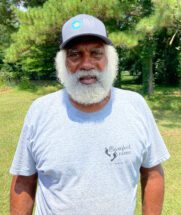
Jacky Frazier, a 73-year-old farmer from St. Helena, said this year’s watermelon crop was “one of the worst” he’s had. Between the weather and deer, Frazier said he doesn’t expect to see many melons come out of his 25-acre crop.
“It’s been so dry this year,” Frazier said. “I used drip irrigation, but the plants couldn’t keep up. Then, some strong winds blew through and hurt the crop. And what the weather didn’t mess up, the deer ate.”
Frazier has been farming since he was 4 years old. He said he depends “a lot” on information and help he gets from Clemson Extension area horticulture agent Zack Snipes.
“Zack keeps us informed,” Frazier said. “He works hard to get us the information we need to be productive.”
Snipes works from the Beaufort County Extension and the Charleston County Extension Offices. The Clemson Cooperative Extension Service has offices located in all South Carolina counties. To find local county offices, go to https://bit.ly/SCCEOffices.
-END-
Growers needed for Fusarium study
Bhupinder Jatana, Clemson assistant professor of horticulture and vegetable crops, is looking for two growers to participate in a fusarium study. Growers who are interested can contact Jatana at bjatana@clemson.edu, or call (864) 633-9087.
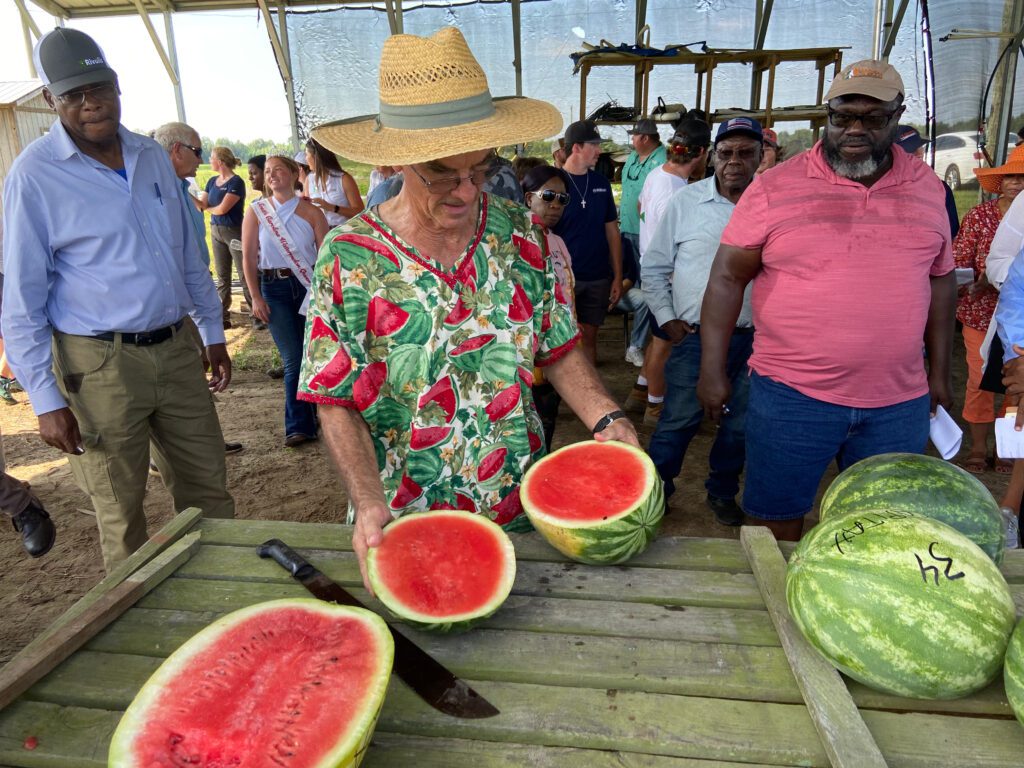
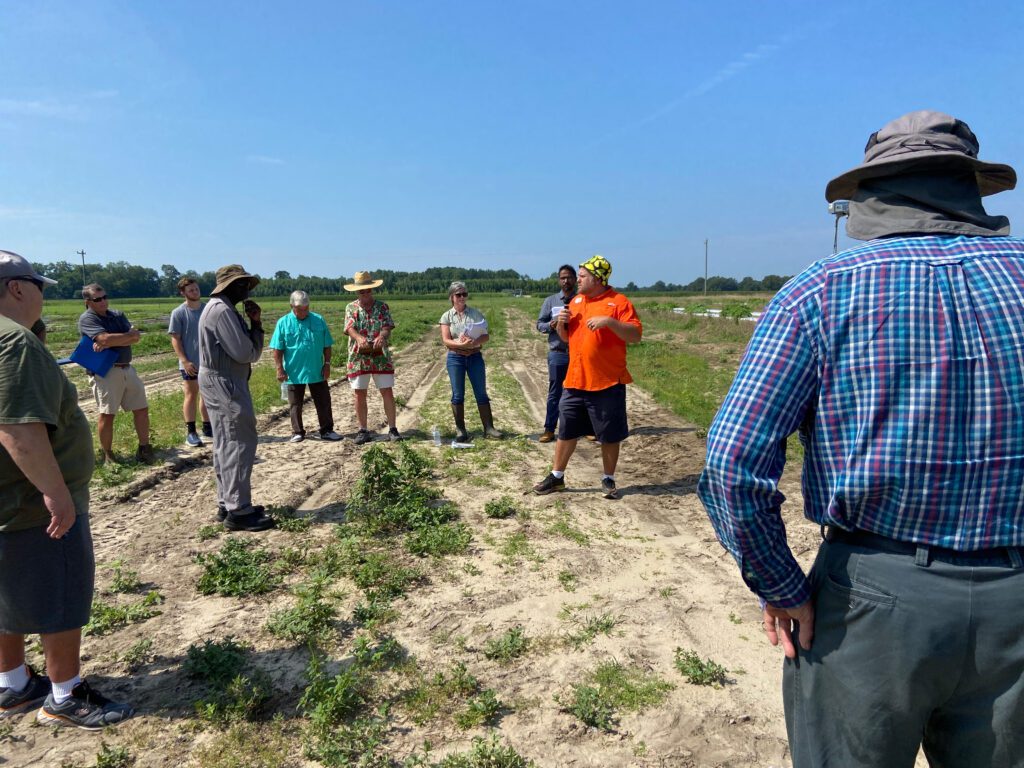
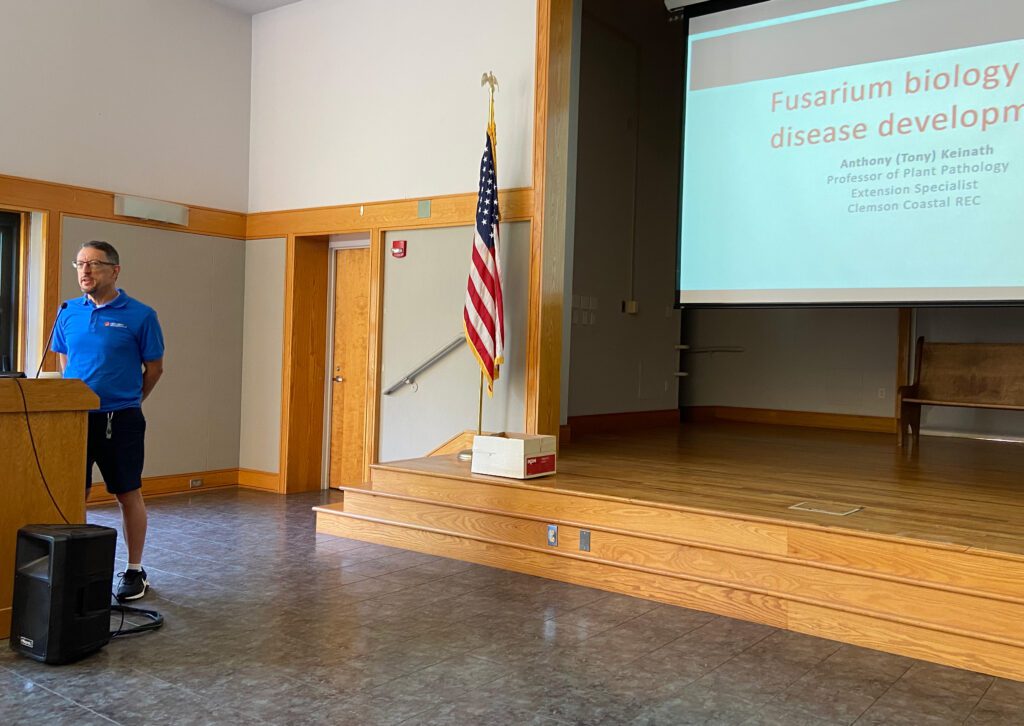
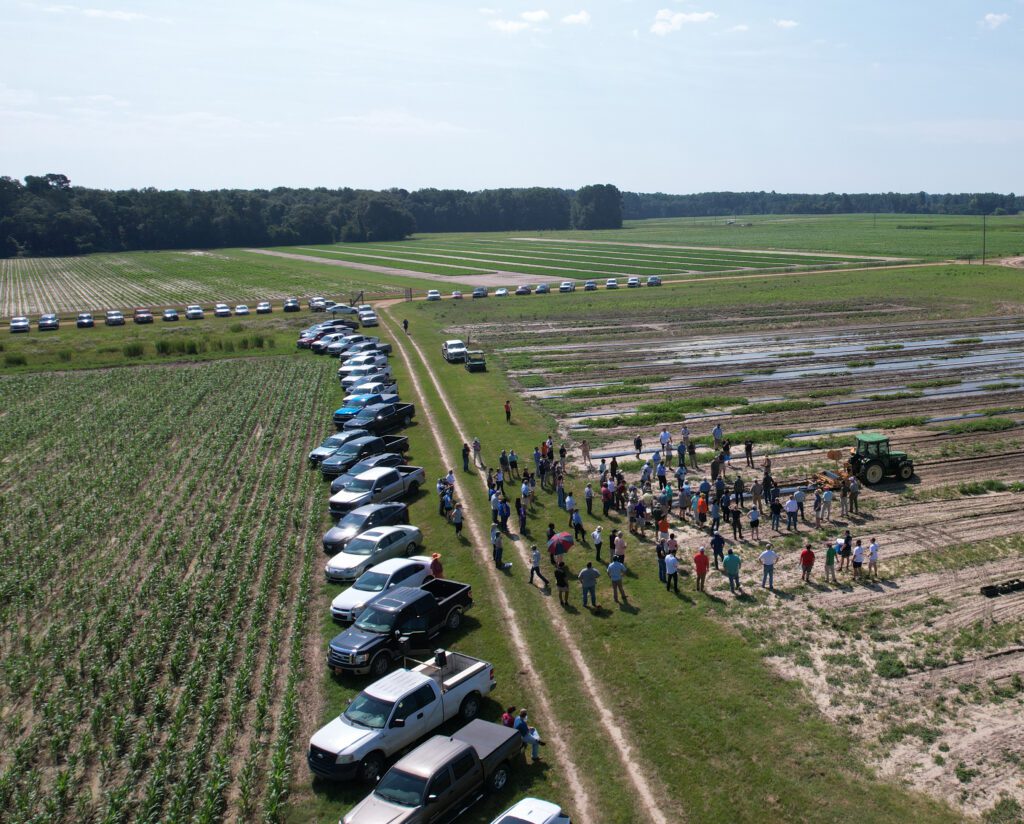
Get in touch and we will connect you with the author or another expert.
Or email us at news@clemson.edu
